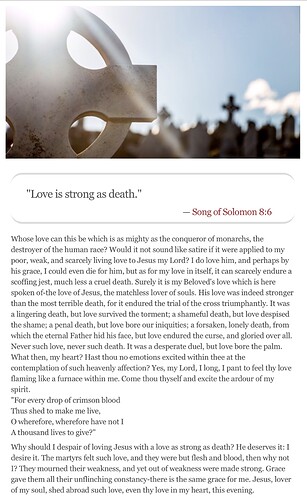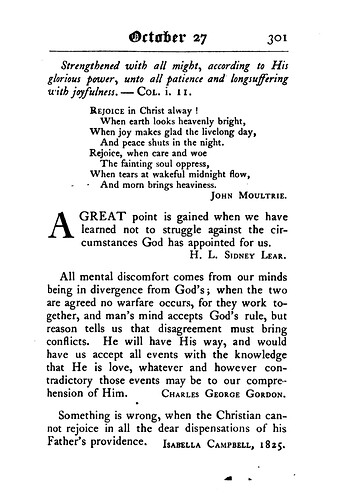(Tap/click the image for better resolution.)
Spurgeon M&E
More Spurgeon. ![]()
![]()
Today my family and I were at the Ojibwa Cultural Museum in St. Ignace, MI. As part of a display explaining Native Americans performing U.S. military service, I saw this quote (unfortunately couldn’t find an attribution), which perfectly sums up why I feel a reading of The LoTR through the lens of war, and specifically the WW1 common soldier, is particularly valuable:
When engaged in combat, it is about the men around you that you depend on to survive, it is you that they depend on to survive, nothing else in the world matters, not the uniform you’re wearing, not the country you represent, not the ideological thoughts of politicians that sent you into harm’s way — but the men to your left and right that are fighting with you. There is no higher bond that connects veterans than that of combat; no sobriety, no alumni, no clubs, nothing can even come close to that of sustained combat and living through it.
Tagging you, just so you don’t miss it, @LM77, @Randy and @Mervin_Bitikofer …
Thank you! Good quote. We were there about 3 years ago, and really enjoyed it as well. Keep warm.
Thank you. As one committed to non-violent resistance, I can attest that the same feeling of comradery is generated among those of us battling those material and and non-material threats (i.e. “evil ideas”) which hinder the in-breaking of the New Kingdom. Our weapons in this case are not guns, but we try to soldier-on nonetheless
From a recent book by Brian McLaren:
For most Christians I encounter today, beliefs are simply what Christianity is. If I point out that in its early years, Christianity was a way of life, not a set of beliefs, they will protest that it was both, and the beliefs had priority. If I point out that the earliest Christians were widely divergent in their beliefs, they are surprised and doubtful; that’s not what they have been taught. If I point out that arguing about beliefs leads to arguments about words, and the New Testament repeatedly and consistently condemns that kind of obsession, they start arguing with me—and if I argue back, there we are, multiplying words, words, and more words, unintentionally proving my point. Christianity’s fervent belief in beliefs has a circular quality to it.
Imagine if scientists reduced science to a list of facts. Imagine if scientists stopped being curious, stopped hypothesizing, stopped designing experiments, stopped replicating those experiments, and stopped subjecting findings to peers for review. Imagine if scientists spent their time policing fellow scientists to be sure they remained faithful to those lists. Science, you might say, would no longer be scientific.
That’s because the genius of science, its heart and essence, is the scientific method, a method by which it can and in fact must amend its facts. Its method helps it sail onward toward greater and greater alignment with reality.
McLaren, Brian D… Do I Stay Christian? (pp. 54-55). St. Martin’s Publishing Group. Kindle Edition.
The hard part is that such a central belief that informs ones life is wrapped up in a mystery. You either do trust in what it is or you don’t. But whatever you say about it will be wrong in as many ways as it is correct in others. Being a believer doesn’t just put one more tool in one’s pouch. You don’t use God; it’s the other way around, if you’re fortunate.
Good sermon, speaking of trust. The whole service is up today, but only today I think – the sermon alone will be available after. The sermon starts at 24:50 in the service, and links to YouTube and Facebook apps are on the page as well. One among several good takeaways, “The answer for trouble is trust.”
Sorry for the digression, but I couldn’t think of another thread to pose this question. Any of you read this book? It came highly recommended.
I have it and a few of his books, but have only started reading Survival is a Style. Which I have really liked so far.
What I’ve read is thoughtful and challenging. He doesn’t write to cheer us up. He’s not happy clappy. But Jay, from what I know of you from around these parts, I think his poetry will resonate with you.
Looking it over just now, I see it needs to move up my list closer to the top. I also see that it’s comprised of his poetry, plus his prose, plus quotes he pulled together from other writers. Splendid!
Well what do you know. They have it at my local library and I’m next in line. I’ll take a look.
My wife only rarely shares quotes from what she is reading and this one by an art historian was shared with her recently in an email from a local woman artist. I have a number of reactions both agreeing and disagreeing on parts. But I can’t unpack it now since we need a walk today before she works with a friend today. Knowing a quote is like a snapshot I started listening to a video of the author give a talk several years ago but also haven’t finished it. So I’ll have more to say later.
The speaker died a few years back but taught at Yale and other places, authoring the article “Why Have There Been No Great Women Artists?” in 1971.
Here is the video I started watching.
(Being childlike before God is important. ; - ) Being thankful for and enjoying beauty and other good things is part of that.
So I agree with her that old age is no guarantor of wisdom. As she says, ossification works against it. That’s why I think it behooves everyone to always have some activity which can still be approached with beginner’s mind where high expectations would be unjustified and the challenge encourages humility. But I don’t share her enthusiasm for all the youthful styles she mentions. Yes to discovery, invention and experimentation. Yes even to the unexpected and contradiction for those tell us where our thinking has missed the mark. But fragmentation, recalcitrance
and antagonism? Those puerile impulses I gladly part with. We can celebrate and strive to retain what is best about youth without also clinging to what is infantile.
Mark,
It’s uncanny to read my thoughts expressed by someone I don’t know. Somewhere there has to be a good middle ground between having a rich store life-experience, and having stopped experiencing new life.
Even the things you dislike in her quote, fragmentation, racalcitrance and antagonism, I think, can have their place in moderation. (Like, why do we hang around here, if we don’t value those things at all?) At least some fragmentation over petrification; if recalcitrance means questioning authorities, well that needs to continue, even mine; if my antagonist is the person who induces me to think and act, rather than doze at rest, then I need that as well. Not obnoxious but motivating.
And your addition about taking on things that can be approached with a beginner’s mind is brilliant. I have already noticed in myself the tendency not to want to do that. But there are some things I’ve had to put on hold for a very, very long time, that if I were to pick up again (and i think would be valuable to) it would certainly be with a beginner’s or near beginner’s mind.
There really is something very liberating about being a beginner with no fore knowledge of any limits as well as very little initial know how. Gardening and reading novels are two pursuits where I’m always finding new things. When we took a Pilates class soon after retirement I enjoyed that very much and it was physically very restorative.
I agree with you that all those things she lists have a positive edge. That was just my fuddy duddy side speaking.
Nobody (that I can imagine) enjoys the obnoxious. And all those things can go that way quickly. But if they don’t get obnoxious, they can be motivating.
This isn’t exactly from my current reading–I did read his “Galapagos” awhile ago-- but I was surprised to stumble on this quote (of unknown source) which seemed prescient in these politicized times. Vonnegut—a closet Anabaptist? Who would have guessed? (ignore the spelling error in the meme)
Whoa, @Jay313, thanks for mentioning this. I’m listening while I repair ragged elementary school library books today. I’ll try to go back and pull out some quotes later. Goes very well with my OUP Kierkegaard: a VSI






